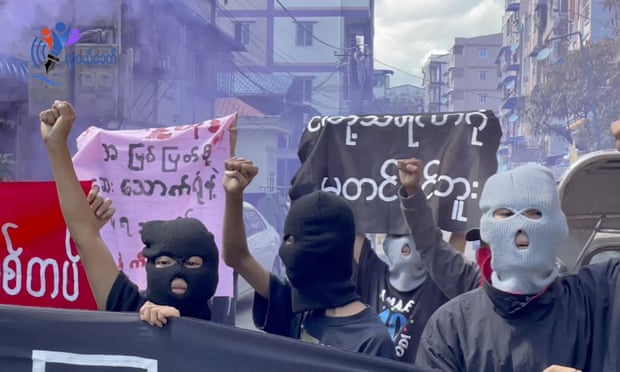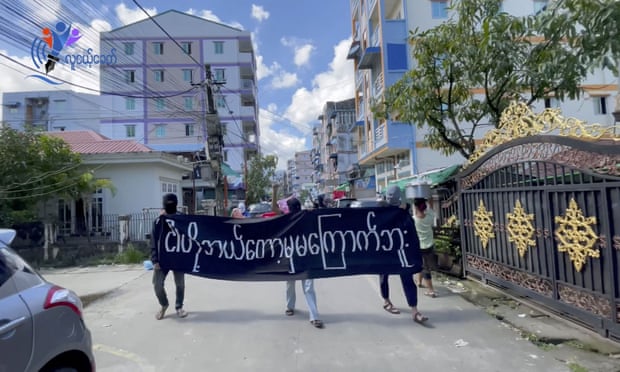‘We are not afraid’: anti-junta groups rail against Myanmar executions | Myanmar | The Guardian
‘We are not afraid’: anti-junta groups rail against Myanmar executions
State killings provoke horror and fear of wider crackdown on determined protest movement

It was the recent execution of four prisoners that drove people to revive the protest regardless. Phyo Zeya Thaw, a rapper and former lawmaker from Aung San Suu Kyi’s party, and the prominent democracy activist Kyaw Min Yu, known as Jimmy, were among those killed. They had been sentenced under anti-terror laws in January.
The people of Myanmar are already well aware of the junta’s brutality, said Salai Za Uk Ling, deputy executive director of the Chin Human Rights Organization, which has documented atrocities, including the burning of homes and massacre of civilians, since the coup. Yet the brazenness of the executions was shocking, he added. “In such a public display of brutality, I don’t know what justification they would give,” he said, adding that it illustrated how the junta did not seem to care about its international reputation.
Thet Swe Win, a 36-year-old human rights activist and an executive director of Synergy, an organisation which strives to foster social harmony in Myanmar, said he feared that there may now be a spate of executions. Dozens more prisoners have been sentenced to death.
“This is similar to the first bullet that they shot at Mya Thwate Thwate Khaing,” he said, referring to the first protester killed by the military after the coup last year. “Then they killed many protesters during the crackdown.”
More than 2,100 people have been killed by the junta and 11,759 remain in detention, according to the advocacy group Assistance Association for Political Prisoners (AAPP) Burma, which monitors arrests and killings.
Ei Ei Moe, 33, is a member of Generation Wave, a movement co-founded by Phyo Zeya Thaw, whom she knew personally. She said he had always wanted the people to stay united.
Observers say the executions are a further attempt to crush opposition that has remained defiant even in the face of crackdowns that the UN rights office has said may amount to war crimes.
Activists say they are undeterred, however. “This generation won’t be scared. If they killed one Zeya Thaw, there will be countless numbers of Zeya Thaw,” said Ei Ei Moe.

Photograph: Lu Nge Khit/Reuters
Activist Ella Chris described Kyaw Min Yu, who rose to prominence as a student leader during the 1988 uprising against the previous military regime, as “an idol for the younger pro-democracy generation”. Before the coup, Ella Chris was an avid cyclist posting fitness videos on social media in between her work on gender equality and land rights. Like many involved in anti-coup protests, she was forced to flee her home. “But we are not afraid,” she said.
Myanmar’s military junta, which seized power in a coup in February 2021, has struggled to maintain control of the country. It faces both peaceful protest movements and a resistance backed by several armed ethnic groups.
Some of these powerful ethnic groups condemned the executions, among them the Arakan Army and a representative of the Kachin Independence Army, which both called the killings a “foolish” act that damaged the prospect of negotiations. In eastern Myanmar, the Karenni Nationalities Defence Force vowed to retaliate against the “war crime”.
While many have been driven to join armed resistance groups that use whatever weapons they can source to fight against the junta, others continue to find ways to hold peaceful demonstrations.
In urban areas, these are flash mobs that last just a few minutes but which must be impeccably planned months in advance, with preparations made for the possibility of someone being detained, said Thinzar Shunlei Yi, a prominent anti-coup activist. “Do we have enough safe houses to relocate, do we have enough information to shut down our Facebook accounts and immediately cut all communication? Because once one person gets arrested then every one of us has to relocate.”
Activists continue even though they know they risking their lives, she added. “Not just our own lives, but it could also cost our own families’ lives, our friends’ lives,” she said. Even a critical comment on Facebook is risky.
Sut Seng Htoi, an activist in Kachin, northern Myanmar, questioned the international response given that the junta declared it would carry out the executions.
“I wonder why they didn’t take any action,” she said. “It’s made me even more distrustful of the international community and UN,” echoing the feelings of many who feel the international community has failed Myanmar.
Thet Swe Win, said the international community “must take tangible actions rather than issuing statements on wasted paper”. He added: “We don’t forget and we don’t forgive. We will keep fighting, even if no one helps us.”
